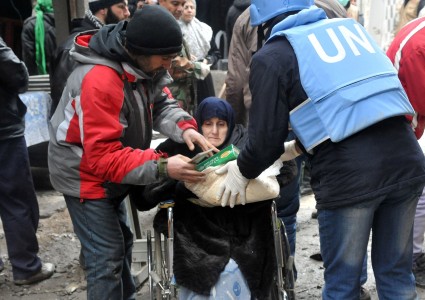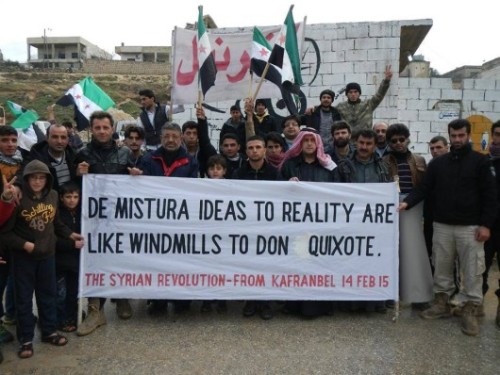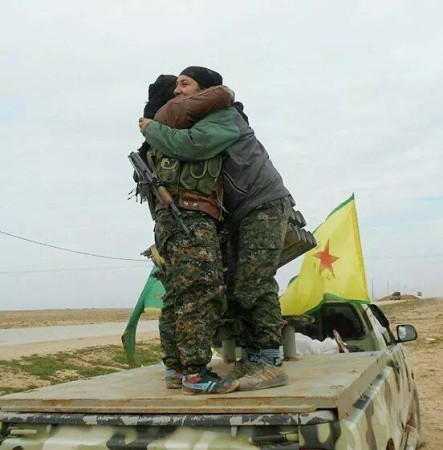LATEST
- Kafranbel’s Protest Message for UN Envoy “Don Quixote” De Mistura
- Kurdish Forces Retake Key Town of Tel Hamis in Eastern Syria from Islamic State
- Domestic Opposition Leader Hussein Released on Bail from 3-Month Detention
- Concern Over Spread of Hepatitis Cases Near Damascus
- Lebanese Army Fires on Islamists Along Syrian Border on Friday
- Islamic State Captures Hill in Damascus Province, Defeats Rebel Faction Jaish al-Islam
- Leading Rebel Factions Try to Mediate In-Fighting Between Jabhat al-Nusra and Harakat Hazm
FRIDAY FEATURE
Beyond Media Hype, Serious Questions About Making of “Jihadi John”
The Assad regime has expelled two key UN humanitarian staff because they spoke to rebel officials while trying to arrange aid deliveries.
One UN representative, working in Homs Province, was declared persona non grata by the Syrian Foreign Ministry on February 9 and given one week to leave the country. On Wednesday, the Ministry gave another staffer working in Aleppo Province a week to depart.
The head of the UN’s humanitarian agencies, Valerie Amos, said in a message that the expulsions “set a worrying precedent for all humanitarian staff in Syria, in that any staff member in contact with armed opposition groups for the purpose of negotiating access is potentially under threat of being declared persona non grata”.
The Assad regime has been blamed repeatedly for hindering the effort to get aid to millions of displaced Syrians.
The UN special envoy for Syria, Staffan de Mistura, visits Damascus on Saturday to pursue his proposed “freeze” in Aleppo, Syria’s largest city, to allow unrestricted humanitarian aid. However, Amos wrote:
Whilst the Government of Syria is giving public support to the Special Envoy’s freeze initiative, they are making it difficult to actually implement it, should agreement be reached by the Special Envoy with all parties.
The Government has removed a key humanitarian staff member with the contacts to negotiate access with a wide range of armed opposition groups in Aleppo, and who was expected to play a leading role in the event that the freeze materializes.
Beyond Aleppo, the expulsions will affect aid operations throughout Syria, Amos said. The two staff were critical in coordination of inter-agency aid convoys.
Leading Rebel Factions Try to Mediate In-Fighting Between Jabhat al-Nusra and Harakat Hazm
Trying to end armed conflict between the Islamist faction Jabhat al-Nusra and the US-backed Harakat Hazm, leading rebel groups have proposed a last-chance deal.
Since November, Jabhat al-Nusra and Harakat Hazm have clashed in northwest Syria. The in-fighting escalated in recent weeks, with each side accusing the other of kidnapping and killing their members and of blocking supplies.
On Thursday, the Levant Front warned Harakat Hazm, which has received US-made heavy weapons, that it could be expelled from the rebel bloc if it did not answer charges of the execution of leading Jabhat al-Nusra members. At the same time, it told the Islamist group to pull back from its threats against Harakat Hazm.
This morning, the leading factions Ahrar al-Sham and Suqor al-Sham demanded that Harakat Hazm hand over its accused killers, that the two sides release prisoners, and that both accept an independent sharia court.
Meanwhile, a Free Syrian Army fighter accuses Jabhat al-Nusra of carrying out raids in Idlib Province to weaken other factions: “The goal of these operations is to take out some FSA brigades who have weapons and do not submit to Nusra’s orders.”
Abu Ahmed al-Idlibi accuses Jabhat al-Nusra of pursuing an “emirate” and says:
Nusra lost its popular support in the Idlib countryside because of bad practices against the locals and its similarity to the Islamic State organization in terms of its actions and unjust laws.
Its relationship with Syrians is like the relationship between a hangman and prisoner.
Residents of al-Atareb in Aleppo Province supporting Harakat Hazm and calling on Jabhat al-Nusra to refrain from attacks:
And a protest in al-Laj in Idlib Province against Jabhat al-Nusra:
Kafranbel’s Protest Message for UN Envoy “Don Quixote” De Mistura
The well-known protesters of Kafranbel in northwest Syria have a message for UN envoy Staffan de Mistura, with his proposed “freeze” plan for Aleppo and his endorsement of President Assad as essential to any political solution:
Kurdish Forces Retake Key Town of Tel Hamis in Eastern Syria from Islamic State
In another swing in the ongoing battle in Hasakeh Province in eastern Syria, Kurdish forces have retaken the town of Tel Hamis from the Islamic State.
The jihadists had advanced in the area this week, seizing villages along the Khebur River and forcing Assyrian Christians to flee or abducting them. However, the Kurdish militia YPG regrouped over the last 72 hours to take the position.
(Photo by Jack Shahine)
Control of Tel Hamis is significant because it is along the route to the Islamic State’s territory in northwest Iraq, including Sinjar, and is central to their ability to move around northeast Syria and the Kurdish cantons.
Kurdish forces are hoping to build on the advance to take Tel Abyad and connect the Kobane and Jazirah cantons.
Yellow section in this map shows the areas #YPG liberated around Til Hemis in last 6 days #TwitterKurds pic.twitter.com/9BElj9Q6ia
— Mutlu Civiroglu (@mutludc) February 27, 2015
Domestic Opposition Leader Hussein Released on Bail from 3-Month Detention
Louay Hussein, a leading opposition figure inside Syria, has been released after three months in detention.
Hussein announced on Facebook that he was being freed and will soon appear in court. He appealed for the release of other political prisoners.
Hussein, head of the Building the Syrian State party, was detained at the border with Lebanon in November and accused of “weakening national sentiment”.
Concern Over Spread of Hepatitis Cases Near Damascus
The Damascus Media Office claims that Hepatitis A is spreading< through the Wadi Barada area and threatening the capital’s supply of drinking water.
The Media Office says, “The Hepatitis A epidemic peaked in the last 10 days where almost five new cases were diagnosed daily, amounting to more than 50 cases, most of them aged between five and 15 years old.”
Physicians in Wadi Barada suspect that the virus has spread as a result of contaminated water. Stores, which are supposed to be sterilized every six months, have not been cleaned since the beginning of the crisis in March 2011.
Abo Mohammed al-Bardawi, manager of the media center in Wadi Barada, said the local council had appealed to the cleaning and sterilizing team in Damascus but had received no reply.
The Damascus Media Office said experts from the General Establishment of Water Supply and Sewage in Wadi Barada had taken samples from the water stores and applied sterilizing tablets as a precautionary measure.
Lebanese Army Fires on Islamists Along Syrian Border on Friday
The Lebanese Army has fired intermittently at Islamists entrenched along its northeastern frontier with Syria on Friday morning, a day after the military killed at least three militants in a “preemptive” operation.
Two barrages of artillery shells were fired on Islamist positions after 7 a.m.
Five soldiers were wounded Thursday in clashes on the outskirts of Ras Baalbek following a dawn offensive.
The Lebanese Army has been battling the Islamic State and Jabhat al-Nusra since the groups briefly occupied the border town of Arsal last August, abducting more than 30 Lebanese security personnel. Scores of Islamists and Lebanese troops were killed in the fighting.
The policy of preemptive shelling was put in place after eight soldiers, including an officer, were killed and 22 others were wounded in clashes with Islamic State fighters on the outskirts of Ras Baalbek in late January.
Islamic State Captures Hill in Damascus Province, Defeats Rebel Faction Jaish al-Islam
The Islamic State has captured a hill in Damascus Province after a battle with the rebel faction Jaish al-Islam, according to both Islamic State and Jaish al-Islam sources.
“IS dodged the Syrian army, and instead attacked the Jaish al-Islam at Tel Dakwa, killing our boys and taking their weapons,” Jaish al-Islam fighter Mohammed al-Shami said. About 20 rebel fighters were killed or captured.
He reassured that the jihadists are “still far” from the rebel-held East Ghouta area: “There are dozens of regime checkpoints and barracks in the region” to cross from Tel Dakwa, 17 km (11 miles) away.
A pro-Islamic State outlet said the jihadists took several tanks, light weapons, and ammunition crates in a dawn attack on Wednesday.



